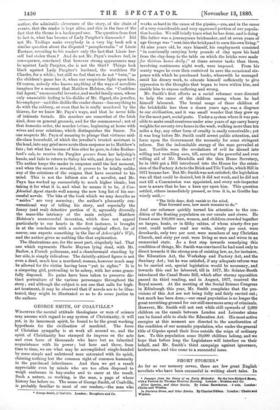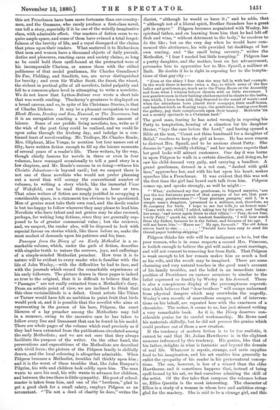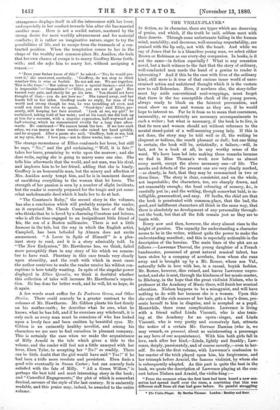SHORT STORIES.*
As far as our memory serves, there are few great English' novelists who have been successful in writing short tales. In
• Pamoges from the Diary of an Early Methodist. By the late Richard Rowe, with s Preface by Thomas Percival Bunting. London : Straka:1 and Co.
Ellice Quentin, and Other Stories. By Julian Hawthorne. 2 vole. London: Chum and Windus.
In Pastures Green, and Other Stories. By Charles Gibbon. London: Oluttto and W Ludas.
this art Frenchmen have been more fortunate than our country- men, and the Germans, who rarely produce a first-class novel, can tell a story, especially if it be one of the weirdly imaginative class, with admirable effects Our masters of fiction seem to re- quire ample space, and some of them have evinced a total forget- fulness of the brevity of life, and a royal disregard of the claims that press upon their readers. What mattered it to Richardson that men and women have a thousand objects of daily pursuit, duties and pleasures, exacting cares and society claims, so long as he could hold them spell-bound at the protracted woes of his incomparable Clarissa, or amuse them with the- stilted politeness of that model gentleman, Sir Charles Grandison P De Foe, Fielding, and Smollett, too, are never distinguished for brevity; and even Sir Walter Scott, the finest, the wisest, the richest in poetical gifts of all novelists, failed palpably and fell to a common-place level in attempting to write a novelette. We do not know that Lytton-Bulwer ever wrote a short tale that was worth reading. Thackeray's greatness is displayed on a broad canvas, and so, in spite of his Christmas Stories, is that of Charles Dickens. It may be a pleasant occupation to read Bleak House, Dombey and Son, Esmond, or The Newcomes, but it is an occupation exacting a. very considerable amount of leisure. Some of our prolific living novelists, too, write as if the wish of the poet Gray could be realised, and we could lie upon sofas through the livelong day, and indulge in a con- tinued feast of novel-reading. Mr. Trollope, Mr. Charles Reade, Mrs. Oliphant, Miss Yonge, to mention but four names out of fifty, have written fiction enough to fill up the leisure moments of several years of a reader's life. These writers, by the way, though chiefly famous for novels in three or even in four volumes, have managed occasionally to tell a good story in a few chapters, and Mr. Reade's success in so doing—witness his Christie Johnstone—is beyond cavil ; but we suspect there is not one of these novelists who would not prefer planning out a novel that will occupy the conventional number of volumes, to writing a story which, like the immortal Vicar of Wakefield, can be read through in an hour or two. That some writers of fiction are amply justified in occupying a considerable space, is a statement too obvious to be questioned. Men of genius must take their own road, and the docile reader is but too happy to follow wherever they may please to lead him. Novelists who have talent and not genius may be also excused, perhaps, for writing long fictions, since they are generally sup- posed to be of greater commercial value ; but the reviewer, and, we suspect, the reader also, will be disposed to look with especial favour on stories which, like those before us, make the most modest of demands upon his patience and his time.
Passages from the Diary of an Early Methodist is a re- markable volume, which, under the garb of. fiction, describes with singular truth to nature the sorrows, joys, and sufferings of a simple-minded Methodist preacher. How true it is to nature will be evident to every reader who is familiar with the life of John Wesley,—with the difficulties he had to face, and with the journals which record the remarkable experiences of his early followers. The picture drawn in these pages is indeed so true to the original, that it is difficult to believe that the " Passages " are not really extracted from a Methodist's diary. From an artistic point of view, we are inclined to think that this close verisimilitude is a defect. Great artists like Titian or Turner would have felt no ambition to paint fruit that birds would peck at, and it is possible that the novelist who aims at representing in the person of his hero, Pidgeon, the exact likeness of a lay preacher among the Methodists may fail in a measure, owing to the excessive care he has taken to follow every line and lineament that can be found in his model. There are whole pages of the volume which read precisely as if they had been extracted from the publications circulated among the early Methodists ; and we are not sure that they always facilitate the purpose of the writer. On the other hand, the persecutions and superstitions of the Methodists are described with vivid force; the picture of the Pidgeon family is skilfully drawn, and the local colouring is altogether admirable. When Pidgeon becomes a Methodist, troubles fall thickly upon him ; and it is the worst of these troubles that, like John Bunyan's Pilgrim, his wife and children look coldly upon him. The man wants to save his soul, his wife wants to advance her children, and between the two there is little sympathy. His post of school- master is taken from him, and one of the "brethren," glad to get a good clerk for a small salary, employs Pidgeon as an accountant. " 'Tis not a deed of charity he does," writes the
diarist, " although he would- so have it ;" and he adds, that "'although not of a liberal spirit, Brother Saunders has a great gift in prayer." Pidgeon becomes acquainted with Wesley, his spiritual father, and on learning from him that he had left off flesh and wine, " without detriment to the body," he resolves to do the like ; but on the very day when he would have com- menced this abstinence, his wife provided fat ducklings of her own rearing, and "the smell being savoury," writes the Methodist, " I fear I needed but little tempting." Pidgeon has a pretty daughter, and the mother, bent on her advancement,
persuades him to apprentice her to Mrs. Spaull, a milliner at Bath. He doubts if he is right in exposing her to the tempta- tions of that gay city:—
"Even at the abbey I fear that she may fall in with bad example. In the week there is service twice a day, to which some of the fine ladies and gentlemen go, much as to the Pump Room or the Assembly and from what I witness behave therein with as little reverence. I saw gentlewomen in their bathing-clothes carried in chairs to the baths, into which, I have been told, they descend to the sound of music; and when the attendants have placed their nosegays, their snuff-boxes, and handkerchiefs on floating trays, the gentlemen, leaning over from the gallery, pay their compliments upon their beauty. Methinks 'tis not a seemly spectacle in a Christian land."
The good man, fearing he has acted wrongly in exposing his Patty to temptation, hearing of a situation for his daughter Hester, "lays the case before the Lord," and having opened a Bible at the text, " Count not thine handmaid for a daughter of Belial," resolves to keep the girl at home. He has soon reason to distrust Mrs. Spaull, and to be anxious about Patty. She dresses in "gay, worldly clothing," and her mistress expects that her good looks will attract customers. One day it was borne in upon Pidgeon to walk in a certain direction, and doing so, he saw his child dressed very gaily, and carrying a bandbox. A grand gentleman, dressed in a red coat, " daubed with gold.
lace," approaches her, and with his hat upon his heart, makes speeches like a Frenchman. It was evident that this was not the first time the girl had heard such talk from him. Pidgeon comes up, and speaks strongly, as well he might :-
"' What,' exclaimed my fine gentleman, in feigned surprise, `are you the too fortunate parent of that paragon of her set, that peer- less young gentlewoman F'—' Your peerless paragon,' said I, is a simple man's daughter, 'prenticed to a milliner, and, therefore, no fit company for lords. I hope to see her wife to an honest man.' Come with me, child,' I added, taking her by the arm, and leading her away, 'and never again listen to that villain.'—' Pray, do not fear, lovely Patty !' quoth he, with insolent familiarity, ' I will bear much from thy father, because he is thy father, and because of his age. I will not harm him.'—' Harm me ! My age, forsooth !' The old Adam
strove hard to rise "Twould have been easy to send his thread-paper lordship skipping.'"
Pidgeon thinks his wife will be as indignant as he is, but the
poor woman, who is in some respects a second Mrs. Primrose, is foolish enough to believe the girl will make a great marriage, and will not consent to removing her from Bath. That Pidgeon is weak enough to let her remain makes him as much a fool as his wife, and the result may be imagined. There are some charming and very natural touches in the good man's account of his family troubles, and the belief in an immediate inter- position of Providence on various occasions is similar to the belief expressed so frankly by Wesley in his Journal. There is also a conspicuous display of the presumptuous supersti- tion which believes that " dear brothers " will escape unharmed from physical dangers which may overwhelm the ungodly. Wesley's own records of marvellous escapes, and of interven- tions on his behalf, are repeated here with the exactness of a. chronicler. The writer, it seems to us, has just 'hissed writing a very remarkable book. As it is, the Diary deserves con- siderable praise for its careful workmanship. Mr. Rowe used his materials skilfully, but he did not possess the genius which could produce out of them a new creation.
If the tendency of modern fiction is to be too realistic, it cannot be said that Mr. Julian Hawthorne is in the slightest measure influenced by this tendency. His genius, like that of his father, delights in what is fantastic and beyond the domain of real life. Whatever is mystic, strange, and eerie supplies food to his imagination, and his art enables him generally to enlist the sympathy of his reader in his preternatural concep- tions. The son, however, is less of a wizard than the elder Hawthorne, and it sometimes happens that, instead of being spell-bound by his art, we find ourselves admiring the skill of the artist. Of the five tales that compose the volumes before us, Ellice Quentin is the most interesting. The character of Ellice is a study of a woman in whom love and ambition strug- gled for the mastery. She is said to be a strange girl, and this strangeness displays itself in all the intercourse with her lover, and especially in her conduct towards him after she has married another man. Hers is not a sordid nature, mastered by the strong desire for mere worldly advancement and for material oomTorts ; it is rather an imaginative nature, eager to try the possibilities of life, and to escape from the trammels of a con- tracted position. When the temptation comes to her in the shape of the wealthy and common-place Mr. Amidou, she feels that her own chance of escape is to marry Geoffrey Herne forth- with; and she asks him to marry her, without assigning a season
"'Does your father know of this ? he asked.—'No; he would pre- vent it,' she answered, excitedly. Geoffrey, do not stop to think whether this is wise or foolish. Eo not ask me. We are together. 'This is the time.'—' But unless we have a special licence,—and that is impossible !'—' Impossible ?'—' Ellice, you are not of age.' She turned very pale, and slowly let go his arm. Yon should not have thought of that,—you do not love me.' She turned away, and her hands fell to her sides. Geoffrey made no reply, for man of the world and strong though he was, he was trembling all over, and
• could not trust his voice to speak. Good-bye,' said Ellice, pre-
sently, still keeping her face averted. Look at me, my girl!' be exclaimed, taking hold of her wrist; and at his tench she did look up at him for a moment, with a singular, expression, half-wayward and half-winning, which he remembered vividly for a long time after- wards. He continued—' We cannot break the law. If we love each .other, we can marry in three weeks—she raised her hand quickly, and ho stopped. After a pause she said, Geoffrey, look at me, look at my eyes, dear. I love you,—not in three weeks, but,—now !'"
The strange earnestness of Ellice confounds her lover, but still he says, " No ;" and the girl exclaiming, " Well, it is fate 1" takes her leave, promising to write upon the morrow; and she -does write, saying she is going to marry some one else. She -tells him afterwards that the world, and not man, was his rival, and implores him to be her friend, adding that she is lonely. Geoffrey is an honourable man, but the misery and affection of _Mrs. Amidou sorely tempt him, and he is in imminent danger of sacrificing everything to the woman that he loves. The strength of her passion is seen by a number of slight incidents, but the reader is scarcely prepared for the tragic and yet some- svhat melodramatic deed which it leads her to do at last.
-" The Countess's Ruby," the second story in the volumes, has also a conclusion which will probably surprise the reader, as it surprised Mr. Claude Campbell, the hero of the tale, qwho thinks that he is loved by a charming Countess and heiress, 'who is all the time engaged to an insignificant little friend of
his, the son of a Boston millionaire. There is not a little humour in the tale, but the way in which the English artist, Campbell, has been befoolcd by Almara does not excite .amusement. "A Lover in Spite of Himself" is a plea- .hant story to read, and it is a story admirably told. In -" The New Endymion," Mr. Hawthorne has, we think, failed more perceptibly than in any story of his which we remem- ber to have read. Phantasy in this case treads very closely upon absurdity, and the craft with which in most cases the author contrives to make the reader receive his wildest con- ceptions is here totally wanting. In spite of the singular power -displayed in Ellice Quentin, we think it doubtful whether
this collection of tales will increase Mr. Hawthorne's reputa- tion. He has done far better work, and he will, let us hope, do it again.
A few words must suffice for In Pastures Green, and Other Stories. There could scarcely be a greater contrast to the volumes of Mr. Hawthorne. Mr. Gibbon plants his foot firmly on his mother-earth ; he describes what he sees, what he knows, what he has felt, and if he exercises any witchcraft, it is only such as every man must be conscious of who has looked 'upon a lovely face and been smitten by beautiful eyes. Mr. Gibbon is an eminently healthy novelist, and among his characters we are sure to find. ourselves in pleasant company. This is certainly the case when we make the acquaintance of Milly Arnold in the tale which gives a title to the volume, and the reader will feel not a little annoyed with her lover, Eben Tyler, in accepting her " No !" so readily. There
can be little doubt that the girl would have said " Yes !" if he Iliad been a trifle more resolute and persistent. Eben finds a good wife eventually in Susan Carter ; but one scarcely feels -satisfied with the fate of Milly. " All a Green Willow," is perhaps the best told and most interesting story in the book ;
and " Cancelled Engagements," the plot of which is somewhat farcical, savours of the style of the last century. It is eminently readable, and this praise may, indeed, be awarded to the entire volume.




































 Previous page
Previous page